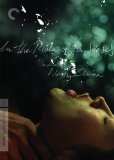| Reviews & Columns |
|
Reviews DVD TV on DVD Blu-ray 4K UHD International DVDs In Theaters Reviews by Studio Video Games Features Collector Series DVDs Easter Egg Database Interviews DVD Talk Radio Feature Articles Columns Anime Talk DVD Savant Horror DVDs The M.O.D. Squad Art House HD Talk Silent DVD
|
DVD Talk Forum |
|
|
| Resources |
|
DVD Price Search Customer Service #'s RCE Info Links |
|
Columns
|
|
|
In the Realm of the Senses - Criterion Collection
THE MOVIE:
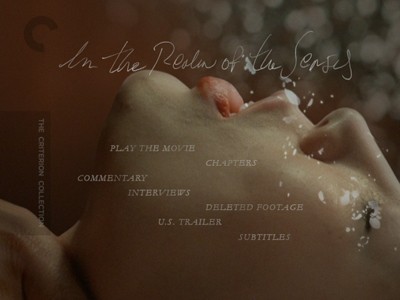
Words like "notorious" and "infamous" come to mind when initially grappling with how to approach In the Realm of the Senses, Nagisa Oshima's 1976 sexual allegory. It's a movie with a reputation, and not one that it has come by unfairly, I might add. Senses is an extremely dirty movie. It's hardcore erotica and explicit enough that if Jerry and George were passing it in the locker room on Seinfeld, they'd use a copy of Tropic of Cancer to cover it up. Yes, Henry Miller is the less salacious of the two evils.
Based on a true incident from 1936, In the Realm of the Senses is the story of two lovers obsessed with each other's bodies and the eventual darkness the pursuit of this obsession leads them into. Sada Abe (Eiko Matsuda) is a serving girl at a local inn who falls into an affair with the married owner, Kichizo (Tatsuya Fuji). A virile man with a voracious appetite, Kichizo has sex with his wife every morning before going to work, but he also "drinks outside the home" when more is required. Though this euphemism does entail actual drinking, the implication is that Kichizo may be ordering more than sake at these other inns. Intrigued by Sada's past history--she was once a prostitute, and she is currently working as a waitress because her husband (whom we never meet) had a business fail--Kichizo instigates an affair with her, one that quickly turns from sneaky encounters in shadowy rooms to a full-blown 24-7 orgy.
No, I'm not exaggerating. It is literally a 24-7 orgy. The pair move to a different inn where they have a marriage ceremony performed by the geisha there, and then they proceed to ravish each other non-stop for days on end, barely pausing to eat and, as far as Sada is concerned, even going to the bathroom is too much time apart. The rare exception out of the home is for her to go visit one of her old clients, a high school principal, who provides them with added money to live on. A brief respite where Kichizo returns to his wife inspires jealousy and rage from Sada, and a night out on the town turns into exhibitionism.
In the Realm of the Senses is pure erotica, which in some eyes is, yes, just a fancy way to say the "p-word." The difference between the two is a debate unto itself, though I would say the difference between erotica and its less-respected sibling is that in erotica, the performers never resort to debasing themselves for the mere purpose of titillation. Though there is sex in just about every scene of this movie, Oshima is adding a subtext to his story of these insatiably perverse partners. Like most erotica, In the Realm of the Senses eventually slips into rather disturbing territory. Sada's need for constant pleasure--she has allegedly been diagnosed by a doctor as "acutely sensitive" and thus she not only needs nonstop action but she also feels it to an exceptional degree--eventually consumes Kichizo, and the pair keep active whether their bodies can handle the stress or not. A pattern of submission and domination is created, and the roles switch quite regularly. The sex play eventually begins to involve food, voyeurism, and violence both consensual and very real. Sada is a disturbed woman prone to fits of rage, but Kichizo is no better despite his even keel. His regular acceptance of Sada's latest idea, as well as his own nasty inventions, and the way he laughs at the kinks can be more unsettling than her pulling a knife on someone or stalking him. Make no mistake, either; in case you're not getting this, In the Realm of the Senses is a very explicit movie, and every act performed is seen in unflinching detail. As the performers challenge each other to go even farther, you will be challenged to go with them. Some may find it hard to keep watching.
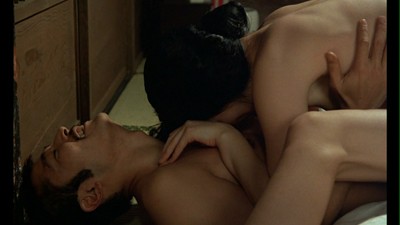
Those same performers are also the main reason to keep watching, despite what shocking things they might do. Eiko Matsuda and Tatsuya Fuji bring an astounding level of craft to roles that could have seen them acting as mere toys for Oshima to bend and pose into his bedroom scenarios. They both manage an impressive level of naturalism in their work, all the more impressive since Oshima is creating an unnatural world around them. Not so much physically--the art direction is fantastic, with a great attention to detail and beautiful colors that look dazzling in this sumptuous new transfer--but more in the broader sense that In the Realm of the Senses is, as the title suggests, meant to be a story that takes place in its own pocket dimension, one where boundaries of social mores and common physical experience are no longer applicable. Regardless of its basis in fact, Oshima takes the story more toward fantasy. The new world he creates is a completely sexualized dimension where everyone is seemingly as horny as Sada and Kichizo deep down, they are just waiting for someone to activate their desires. Everywhere they go, someone is either talking about sex, thinking about sex, or having sex, and if they aren't going to join in, they are content to watch.
There are more specific and detailed readings to be made of In the Realm of the Senses. Those who are more informed of Japanese history and the social structure can find political meanings in the movie that are, honestly, lost on me--though many of the extras on this DVD do lead the way to understanding more about what Nagisa Oshima intended to do with this taboo-breaking picture. Sure, there are some shots featuring soldiers, a sign of Japan's militaristic leanings in the 1930s, but not much indication beyond that of what kind of tide the pair may be working against. I'm not a completely unintelligent guy, so one does have to question why a film more than thirty years old continues to travel the world and intrigue viewers despite the fact that one of its main subtexts is not immediately discernible to what I would guess would be the bulk of the viewership. Is this maybe the function of erotica, to provide us with a viable argument for looking at smut? "I don't surf the internet to get my jollies, I look at Art"?
The question also remains of how to process said smut. If we are to accept that most highbrow erotica drifts into skeevy territory, delving into fetishes and more extreme thrills, then how to reconcile the titillation we may or may not feel? This is not like browsing the shelves at the adult bookstore to find that one DVD that suits a particular pleasure, this is a film director laying out a smorgasbord of kinky treats and saying that if you are going to partake of one, then you will partake of all. The downward slide is not an indicator of a moral message, either; Oshima is not warning us that if we give in to our carnal nature, we will end up like Sada and Kichizo. Even so, I find myself in agreement with the witnesses who eventually turn away from his characters in the movie. In due course, the outsiders who are initially eager to watch the copulating drift away from the lovers, repulsed by their lack of control and their refusal to even pause to clean themselves. The principal rejects Sada because she smells, the geisha stop coming to entertain the couple out of fear of what they might do, and when it came down to it, I found myself turning away, too. What was it all for? Am I merely meant to see there are consequences to all human behavior? To question the nature of voyeurism, that to accept one behavior as worth spying on, I must take my peeping the whole way? Or is Oshima flipping the script, turning the dominance theme on the viewer? At the beginning, I felt I was in charge, but by the end of In the Realm of the Senses, it was in charge of me.
Perhaps this is the insurmountable hurdle of all controversial films, that they may maintain their ability to shock while losing whatever social significance made them seem relevant in the first place. Or maybe it's that the initial scandal was so overpowering, it obscured that there wasn't more movie underneath. That's certainly how I felt when recently watching La Grande Bouffe, or even upon viewing Salo. Both left me feeling like I got what they were saying but they failed to explain why it should matter. (Then again, maybe it's not a matter of time and just a fault of the genre, as Alan Moore and Melinda Gebbie's recent comic book foray into the erotic, Lost Girls, inspired much the same reaction.) In the Realm of the Senses, no matter how well-made from an aesthetic standpoint, no matter how gorgeously photographed and expertly acted, still only has the flimsiest of stories, its plot no better than the clichés of XXX skinflicks about randy co-eds getting it on with the pizza man or bored housewives getting some extra chlorination from the pool boy. Perhaps it's just a problem with me and my own puritanical upbringing rearing its judgmental head, but I can't help think that despite the considerable amount of fuss, In the Realm of the Senses is not about very much.
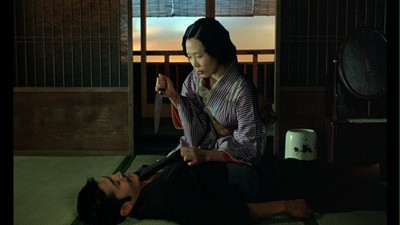
THE DVD
Video:
Criterion has brought In the Realm of the Senses to DVD with the greatest of care, creating a 1.66:1 anamorphic transfer that looks unbelievably crisp. This bright and colorful movie looks brand-new, like it was shot just yesterday, with an astounding level of detail visible on the screen. Truly one of the best looking discs I've seen.
Sound:
The original Japanese soundtrack is given a new monaural mix that is as bright and lively as the transfer, with excellent balance between the music and the dialogue. Be warned, you may not want to crank the volume if your neighbors are home, they will know you are watching a dirty movie!
The optional English subtitles are perfect, paced at a good speed and written with flair.
Extras:
In the Realm of the Senses - Criterion Collection is packaged in a clear plastic case with double-sided covers. A thick, 36-page color booklet features photos from the film, credits, chapter listings, and two text pieces: an essay by Donald Richie and a piece by Nagisa Oshima.
The commentary by film critic Tony Rayns is understandably austere, and Rayns is very quick to point out that he is not going to critique the more licentious elements of the mise-en-scene, though naturally he can't avoid it altogether. He focuses mainly on the politics surrounding the film, both past and present (the French co-production was technically against the law in Japan), which basically covers the politics of the story's timeline and the politics of blue movies. He also provides background on the director and his actors.
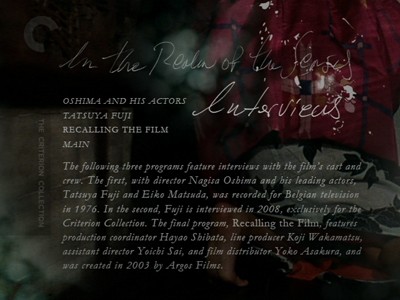
A variety of interviews make up most of the extras. The first is a vintage 1976 interview (5 minutes, 35 seconds), featuring Nagisa Oshima, Tatsuya Fuji (who doesn't really speak), and Eiko Matsuda. Apparently shot for Belgian television, they discuss how the movie came about and the nature of the production, including talking to Matsuda about the challenges of her role (and humorously zooming in on a flower pinned to her breast at one point, a shot that seems a tad leering). Fuji also sits down for a contemporary interview (17:15), looking back at his own experience with the movie.
More comprehensive is "Recalling the Film" (38:45). Produced in 2003, it gathers a variety of contributors to In the Realm of the Senses, including a cultural critic, members of the crew, and the man who put the French deal together. Each have personal anecdotes about the movie and its challenging production, and the brief snippets make for some interesting stories, including covering run-ins with loan sharks, fist fights, the natural charisma required of a phallus in a starring role, and the proper way to cook eggs for sexual consumption.
Just over 12 minutes of deleted material is included, placed in the context of where the scenes would have appeared in the film. There is also the trailer for the original American release.
FINAL THOUGHTS:
Rent It. I know In the Realm of the Senses is revered by many, but I have to acknowledge the fact that were I not a Criterion collector, I doubt I'd purchase this disc. I can't see myself watching it again very soon, and beyond the reactions that different viewers may have to the explicit nature of the film, I just don't think it holds up. Nagisa Oshima's 1976 exploration of an obsessive sexual relationship is a beautifully made film with fantastic sets, costumes, and performances from its lead actors. It both titillates and repulses, and it does have suggestions of grander themes that inform the kinky events the Japanese director depicts. Even so, much of those thematic elements are tied to a particular time and a particular political structure, and I have to question how many viewers will even spot them. (Who knows? Maybe it's just me.) A great package and informative extras make it worth a look, but best to sample before buying.
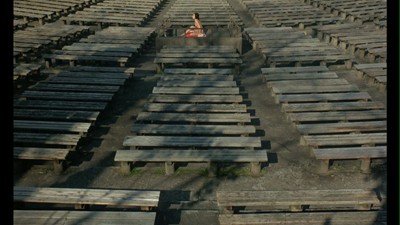
Jamie S. Rich is a novelist and comic book writer. He is best known for his collaborations with Joelle Jones, including the hardboiled crime comic book You Have Killed Me, the challenging romance 12 Reasons Why I Love Her, and the 2007 prose novel Have You Seen the Horizon Lately?, for which Jones did the cover. All three were published by Oni Press. His most recent projects include the futuristic romance A Boy and a Girl with Natalie Nourigat; Archer Coe and the Thousand Natural Shocks, a loopy crime tale drawn by Dan Christensen; and the horror miniseries Madame Frankenstein, a collaboration with Megan Levens. Follow Rich's blog at Confessions123.com.
|
| Popular Reviews |
| Sponsored Links |
|
|
| Sponsored Links |
|
|
| Release List | Reviews | Shop | Newsletter | Forum | DVD Giveaways | Blu-Ray | Advertise |
|
Copyright 2024 DVDTalk.com All Rights Reserved. Legal Info, Privacy Policy, Terms of Use,
Manage Preferences,
Your Privacy Choices | |||||||









